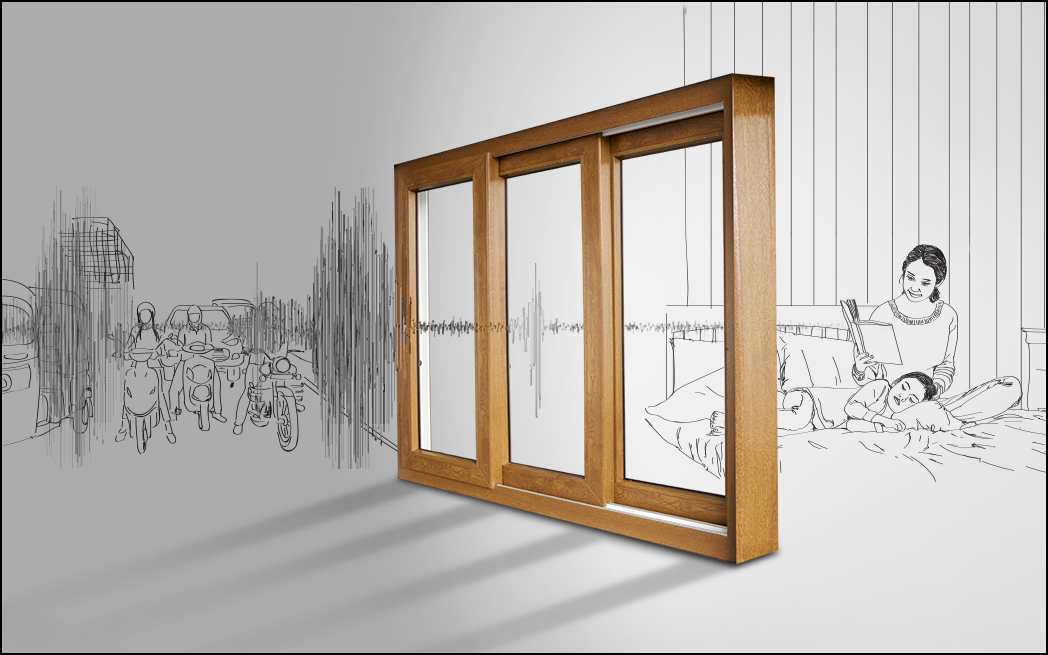Windows that cut outside noise!
Living in an urban environment noise levels can become extremely annoying or even harmful, affecting both the quality of life and your health.
Despite growing evidence about the many medical, social, and economic effects of noise, we are unable to make the connection between noise stress and disease. And you should be taking corrective action as quickly as possible, instead of ignoring the problem. That’s where uPVC windows come in.
According to the World Health Organization, noise leads to loss of hearing; sleep disturbances; cardiovascular and psycho-physiologic problems; performance reduction; and annoyance responses.
Noise levels in excess of 80 dB is potentially hazardous. (80 dB is roughly equivalent to the noise of heavy truck traffic on a busy road). In the young, hearing loss affects communication, cognition, behavior, social-emotional development, and academic outcomes. It is important to realize that ears do not get used to loud noise — they turn deaf.
Noise can lead to a number of personal disabilities, handicaps, and behavioral changes. These include problems with concentration, fatigue, lack of self-confidence, irritation, misunderstandings and decreased working capacity.
It is also known that continuous noise in excess of even 30 dB disturbs sleep. When sleep disruption becomes chronic, physiological problems set in and begin to impact our health.
Noise is also linked with heart attack and stroke. Not just our physical health, noise can also accelerate and intensify the development of latent mental disorders.
Contents
Noise Reduction Solutions That Work
Conventional windows and doors are not effective at cutting outside noise because sound, like water, seeps through the smallest of gaps. Venster uPVC windows and doors help reduce noise pollution by simply causing the sound wave to lose power. This is achieved by using materials that will absorb and reflect sound – like appropriate glazing, i.e. window glass, as well as using double sealants, by building frames with thicker walls; and by ensuring the frames are multi-chambered in order to combat noise.
Double glazing
Double glazing creates excellent soundproofing by sandwiching a cavity of air or inert gas between two panes of glass. This works as a barrier to stop heat, cold, and noise.
Secondary glazing
This is considered to be the best method of soundproofing windows because it enables you to add a secondary layer of glass of another thickness with an insulated air gap to stop noise.
Laminated glass
Specifically coated to help stop noise transfer, this glass is typically sold as safety glass or acoustic glass. When added as secondary glazing to an existing single pane window, it can result in noise reduction of an average of 45 dB or more.
Insulated frames
High quality uPVC frames are insulated and will reduce sound transference as well as reduce heating and cooling loss at the same time.
Inert gas cavities
Most double glazing features an inert gas cavity between the panes. This cavity can be crucial in stopping sound. Choosing a larger cavity of 50 mm to 200 mm will block more sound.
Multi-chambered
Venster provides multi-chambered uPVC windows where the joints are fuse-welded to improve the overall sealing capability of the window. These are an added benefit to the already soundproof uPVC windows that Venster designs.
Insulating your space from outside noise doesn’t mean you compromise on aesthetics. Venster uPVC windows and doors can be customized to suit your needs. Choose from a range of colors, laminate textures and designs and give your place a stunning makeover with windows and doors that just don’t look beautiful but also cut outside noise.
Leave a Reply
You must be logged in to post a comment.

